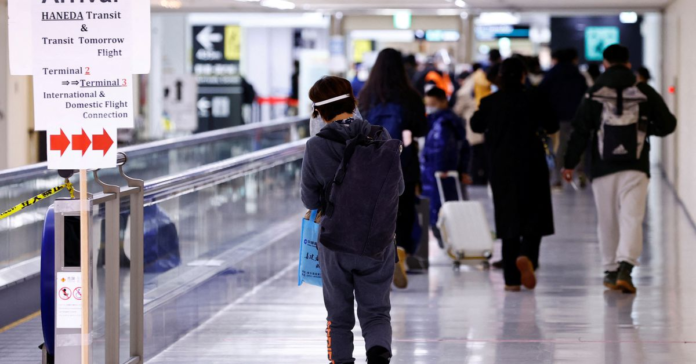Summary
Summary Companies Air passenger volumes at 63% of 2019 levels
Travel recovers ahead of the Lunar New Year
Surge in infections feared as millions head to home towns
Cinema tickets sales expected to surge
SHANGHAI, Jan 14 (Reuters) – People in China are resuming travel ahead of the Lunar New Year, despite worries about infections after Beijing dropped COVID-19 curbs last month, with air passenger volumes recovering to 63% of 2019 levels since the annual travel season began.
The rapid business recovery is challenging airlines’ ability to ensure safety, and great attention to pandemic-related risks is needed, said Song Zhiyong, head of the Civil Aviation Administration of China.
The industry needs to “fully understand the special nature, and complexity of the Spring Festival migration in 2023”, Song said in a statement on Friday.
Since the Jan. 7 start of the annual migration, as Chinese return to their hometowns in preparation for the holiday set to begin on Jan. 21, flight passenger numbers stand at 63% of the 2019 figure before the pandemic, the aviation regulator said.
China re-opened its borders on Jan. 8 after having abruptly abandoned in December a strict anti-virus regime of frequent testing, travel curbs and mass lockdowns that had fuelled historic nationwide protests in late November.
The transport ministry has predicted passenger traffic volumes to jump 99.5% on the year during the festival migration, which runs until Feb. 15, or a recovery to 70.3% of 2019 levels.
In the gambling hub of Macau, Friday’s 46,000 daily inbound travellers were the highest number since COVID-19 emerged in early 2020, the majority from the mainland, the city government said. It expects a Spring Festival boom in tourism.
The holiday week is also a key time for new movie releases in China.
Cinema box office receipts are on track to generate revenue of as much as 10 billion yuan ($1.5 billion) during the Spring Festival period, a brokerage has forecast.
Although the figure is about the same as for 2022, it points to a recovery in annual ticket sales, as cinema visitor numbers slumped after COVID worsened to bring spring lockdowns last year in major cities, such as Shanghai, the commercial hub.
The revival in activity is expected to boost revenues as seven new Chinese films, including the highly-anticipated “The Wandering Earth 2”, will be screened during the festival.
Topsperity Securities expects festival box offices could hit 10 billion yuan in the most optimistic scenario. Investment Bank CICC estimates the number could reach 8.6 billion yuan.
According to Guosen Securities, box office revenues in 2022 totalled less than 30 billion yuan, down 36% from a year earlier.
RURAL SURGE FEARED
However, infections are expected to surge in rural areas as hundreds of millions return home from big cities.
That fear is reflected in a scramble for oxygen-generating equipment, as most products of top-selling brands are sold out on e-commerce platforms such as JD.com, according to Reuters checks and buyers’ online comments.
One firm, Jiangsu Yuyue Medical Equipment & Supply Co (002223.SZ) is marshalling all possible resources to respond to customer needs, it assured investors on an online platform recently.
In addition, surging demand for health checks on those who have recovered from COVID is boosting hospital demand for CT scanning equipment, the China Securities Journal said.
This week, the World Health Organization warned of risks stemming from holiday travel.
One Chinese expert has warned that the worst of the outbreak has not yet passed, media outlet Caixin said this week.
“Our priority focus has been on the large cities. It is time to focus on rural areas,” it quoted Zeng Guang, the former chief epidemiologist at the Chinese Center for Disease Control and Prevention, as saying.
Many in the countryside, where medical facilities are relatively poor, were being left behind, including the elderly, the sick and the disabled, he added.
Authorities have been reporting five or fewer deaths a day over the past month, figures inconsistent with the long queues seen at funeral homes and the body bags leaving crowded hospitals.
China has not reported figures of COVID deaths since Monday. In December, officials said they planned monthly, rather than daily updates.
While international health experts have predicted at least 1 million COVID-related deaths this year, China has reported just over 5,000 since the pandemic began, one of the lowest death rates in the world.
($1=6.7010 Chinese yuan renminbi)
Reporting by Shanghai newsroom; Editing by Tony Munroe and Clarence Fernandez
Our Standards: The Thomson Reuters Trust Principles.
Air travel recovers in China amid COVID infection worries
Recent Comments
on Iowa State starting RB Jirehl Brock among latest college football players charged in gambling probe
on The Rev. Al Sharpton to lead protest after Florida governor’s ban of African American studies course
on Sports World Hails ‘Superwoman’ Lindsey Vonn for Her Grand Comeback Despite Career-Changing Injury
on San Mateo County Community College District sues five companies over role in ‘pay to play’ scandal
on Saipan, placid island setting for Assange’s last battle, is briefly mobbed – and bemused by the fuss
on ‘Pokémon Scarlet’ and ‘Violet’ Fan Theories Suggest Legendary Time Travel, Alternate Dimension Plot
on Joe Manchin and Tommy Tuberville introduce bill on name, image and likeness rules for college sports
on Inside the Michael Jordan ‘Air’ movie, plus why NFL, others are buying into the sports film industry
on If you’re a frequent traveler, these wrap tops from Aday will revolutionize your on-the-go wardrobe
on How Does Jack Nicklaus Travel? Exploring the Private Jets Owned by the ‘Golden Bear’ Over the Years
on Hollywood Reporter: Tom Cruise negotiated with movie studios over AI before the actors strike began
on Ford Blue Cruise: US regulators investigate fatal crashes involving hands-free driving technology
on Dozens of boats cruise the Seine in a rehearsal for the Paris Olympics’ opening ceremony on July 26
on Devout athletes find strength in their faith. But practicing it and elite sports can pose hurdles
on Despite strong Lunar New Year holiday data, consumer spending in China isn’t roaring back just yet
on David and Victoria Beckham so ‘Charmed’ by Tom Cruise They Have His Photos on Display at Their Home
on CONCEPT ART: New Details Revealed for Disney Cruise Line Lookout Cay at Lighthouse Point Destination
on CBS Sports announces Matt Ryan will join NFL studio show. Longtime analysts Simms and Esiason depart
on Boston College vs. Army live stream, how to watch online, CBS Sports Network channel finder, odds
on Boise State vs. Air Force live stream, odds, channel, prediction, how to watch on CBS Sports Network
on Biden to tout bill’s prescription drug prices, energy provisions in pitch to Americans, aide says
on After UFC Fallout, Conor McGregor Offers a Valuable Piece of Advice to Free Agent Francis Ngannou
on 2024 Super Bowl: CBS Sports Network and CBS Sports HQ to combine for 115 hours of weeklong coverage
on ‘Best Intention’: Chris Kirk Has Absolute Trust in Jay Monahan and PGA Tour’s Widely Debated Model
on 2023 NFL All-Rookie Team: CBS Sports draft expert, former GM unveil league’s best first-year players
on “Completely Knocked Me Out”: Rob Lowe Recalls Boxing Match With Tom Cruise On 1983 Brat Pack Classic
on CONCEPT ART: New Details Revealed for Disney Cruise Line Lookout Cay at Lighthouse Point Destination
on “Completely Knocked Me Out”: Rob Lowe Recalls Boxing Match With Tom Cruise On 1983 Brat Pack Classic
on CBS Sports announces Matt Ryan will join NFL studio show. Longtime analysts Simms and Esiason depart
on Carlos Sainz’s Soccer Fanboy Emerges as Spaniard Shares Defining Moment With This Real Madrid Legend
on Biden: ‘At this point I’m not’ planning to visit East Palestine, Ohio, after toxic train derailment
on ‘Best Intention’: Chris Kirk Has Absolute Trust in Jay Monahan and PGA Tour’s Widely Debated Model
on Ahead of big sports weekend, dispute with Disney leaves millions of cable subscribers in the dark
on A heavy wave of Russian missile attacks pounds areas across Ukraine, killing at least 4 civilians
on 2024 Super Bowl: CBS Sports Network and CBS Sports HQ to combine for 115 hours of weeklong coverage
on 2023 NFL All-Rookie Team: CBS Sports draft expert, former GM unveil league’s best first-year players
on Army vs. Coastal Carolina live stream, how to watch online, CBS Sports Network channel finder, odds
on AL Rookie of the Year Julio Rodriguez Spreads Joy and Sportsmanship to the Youth of Loma de Cabrera
on After UFC Fallout, Conor McGregor Offers a Valuable Piece of Advice to Free Agent Francis Ngannou
on Dubai International Airport sees 41.6 million passengers in first half of year, more than in 2019
on Devout athletes find strength in their faith. But practicing it and elite sports can pose hurdles
on Despite strong Lunar New Year holiday data, consumer spending in China isn’t roaring back just yet
on Dave Portnoy: Taylor Swift’s security should ‘drag Kim Kardashian to jail’ if she attends Eras Tour
on CONCEPT ART: New Details Revealed for Disney Cruise Line Lookout Cay at Lighthouse Point Destination
on “Completely Knocked Me Out”: Rob Lowe Recalls Boxing Match With Tom Cruise On 1983 Brat Pack Classic
on CBS Sports, Serie A announce new TV rights deal; Paramount+ to air over 400 Italian soccer matches
on Cam Newton’s Violent Public Incident Draws Hilarious Reaction From 3x All-Star: “Where Do I Sign Up
on Boston College vs. Army live stream, how to watch online, CBS Sports Network channel finder, odds
on Angel Reese Launches Foundation Dedicated To Empowering Women Through Sports & Financial Literacy
on A weaker dollar, skyrocketing prices and ‘record’ visitor numbers: Good luck in Europe this summer




